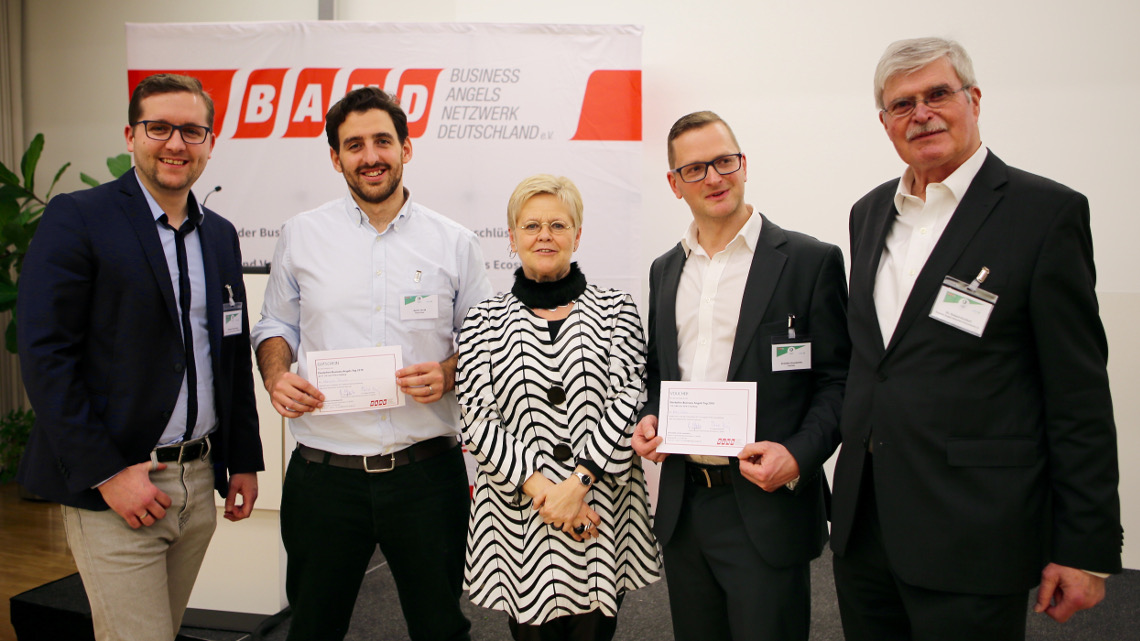Greentech start-ups looking for investors
17 green start-ups were competing for potential investors in Berlin. Biobased plastic produced in Sweden and a map for air quality developed in Munich convinced the panel.

There is a lively start-up scene in Germany. It is supported and funded by the federal ministry as well as other sponsors via the Business Angels Netzwerk Deutschland e.V. (BAND). Many of the new businesses develop innovative ideas regarding energy and resource efficiency and are thus thematically on point for the 17 Sustainable Development Goals (SDG) drawn up by the United Nations as part of the Agenda 2030.
But how can such innovative and sustainable start-up ideas be combined and connected with potential investors? To that end BAND and Cleantech Scandinavia organised the GreenUp Invest event in Berlin on December 6th. Biobased plastic from Sweden and a high-resolution air quality map from Munich were able to convince the investors the most. They received an invitation for the “German Business Angels Day 2018” in Hamburg.
A guidebook for green investments
Already during her opening address at the GreenUp invest event, Ute Günther, CEO at BAND, promised a “day chock-full of marvel and surprises”. The goal of the Green Start-up Investment alliance is to support and advance green founder financing in Germany. The Borderstep Institute for innovation and sustainability gGmbH is coordinating these efforts.
Constanze Trautwein, scientific fellow at the Borderstep Institute since February 2017, introduced a new guidebook for the appraisal of the sustainability potential for any given start-up. “Our guidebook was recently piloted and is based on three main categories,” says Trautwein. “The first one focuses on company context – which sector is the company part of? The second category is related to the concept of the company, and the third one asks for the products and services.” Especially the third category is also supposed to ascertain, which of the SDGs the start-up will address.
Economics and sustainability are not mutually exclusive
The potential investors expressed their assessment more careful: Steffen Funk, investment manager at Statkraft Ventures GmbH in Düsseldorf noted that financial aspects were still the primary focus point regarding the assessment of new ideas. “We are investing in new technologies and ideas that are relevant for the energy sector. Of course our main concern is their market value.”
Oliver Goseman, member of BAND and managing partner at GOSFAM Investment GmbH was in agreement: “We are still addressing economical and personnel- related issues first when are thinking of a new investment – long before any assessing any sustainability aspects.” Goseman also criticised the distance and discrepancy between sustainability experts and investors, who can barely follow the detailed and technical arguments. “We need to build a bridge between the scientific experts and the investors – economy and sustainability are not mutually exclusive.”
Nano-membranes and flat-screen TVs
The 17 participating start-ups from Germany and Scandinavia had five minutes each to present their varied and innovative ideas as an elevator pitch to the potential investors. Subsequently the young entrepreneurs had a chance to convince the investors in short one-on-one-talks. The topics of the start-ups covered the fight against food waste via a digital market place, stabilising the electricity grid, establishing new and renewable energy sources and developing, producing, and marketing of carbon-based nanomembranes.
Moreover, start-ups focussing on circulator economy also presented their business ideas. The Swedish company 2p1 for instance, which reuses light bulbs and light sources from old flat-screen-TVs as energy-efficient light sources in schools. Last but not least, new software developments were also presented: Like the Scandinavian ApParkingspot, who aim to shorten the search for sparking spots in cities and thus minimise exhaust fumes via an app that tells users were they can find a free parking place. For the future the entrepreneurs also plan to use a similar software for drivers of electric cars to reserve a charging station.
Biobased plastic and high-resolution air quality map win
In the end, the Scandinavian Polylabs and the Munich-based start-up Hawa dawa were able to convince potential investors. Polylabs produces and sells biobased Polyol, one of the basic elements of polyurethane (PU) and thus a key element of the plastics industry, which has so far mostly been petroleum based. With the production of bioplastic, resources and the environment are protected. The German company Hawa dawa is developing new sensors and machine learning algorithms, which can compute a comprehensive high-resolution map of air quality in real time.
A big vision by a qualified team
For the winners of the competition as well as all the other participating start-ups, Goseman and his fellow investors had a few suggestions for any future pitches: “During the pitch the idea of the company has to come alive,” he stresses. The point is to present a huge vision with a realistic plan, that covers market interests and is managed by a capable team. “You need an excellent team in order to realise a start-up idea and move society towards more sustainability.”
jmr


